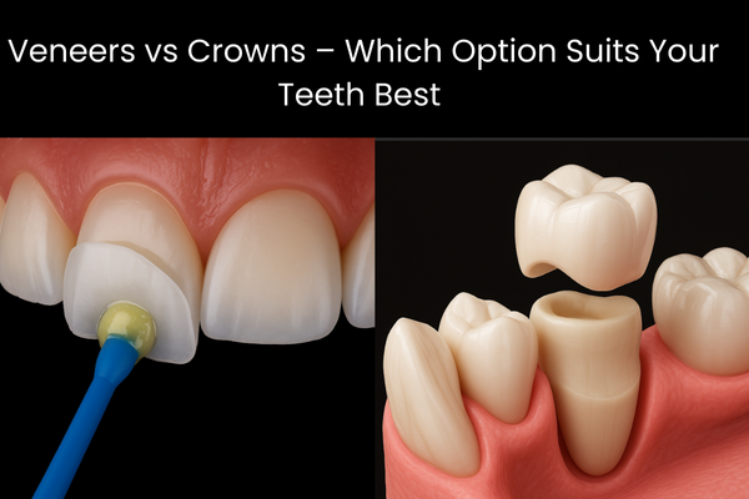
Damaged teeth can affect your smile. Dental treatments like veneers and crowns help cover flaws and restore confidence. Explore this blog for a detailed veneers vs crowns comparison, what veneers and crowns are, how they work, their pros and cons, and which one to choose for your dental problem.
What are Veneers?

Veneers are very thin, customized shells made of porcelain or resin. They help you hide stains, chips, gaps, and even white spots on teeth, giving you a flawless smile
Types of Dental Veneers
- Composite Veneers: These veneers are made of composite resins and are used to cover minor cosmetic issues without teeth shaving. That is, they require little to no enamel reduction before placement, making them a less invasive option.
- Porcelain Veneers: Made from high-quality porcelain, these veneers address several cosmetic dental concerns. A small amount of enamel is gently removed before the veneers are attached to the teeth. Porcelain veneers are also commonly used as veneers for grey teeth, since they provide a brighter, natural-looking shade.
- Removable Veneers: These veneers can be put on and taken off easily to cover up your dental imperfections. Be it a gap between your teeth or a discolored tooth, clip-on veneers are a fast, non-invasive route to a perfect smile.
How They Work

For traditional veneers (usually porcelain), your dentist will remove a thin layer of tooth enamel to prepare your teeth for the veneers. Then the veneer shells are placed over the teeth, bonded with the same adhesive used in dentures.
On the other hand, no-prep veneers (usually composite resin) are bonded to your teeth without enamel removal, making the process completely reversible.
Cost of Veneers
The cost of veneers varies depending on the type you choose, the severity of your condition, and some other factors. Typically, composite veneers cost around $650 to $1,500 per tooth in New Zealand, and porcelain veneers cost between $1,500 to 2,500 per tooth.
What are Dental Crowns

Caption: Dental Crown
If you’re looking for the best option for damaged teeth, dental crowns are often recommended because they bring back both strength and structure.
A dental crown is a tooth-shaped cap that fits over a weakened or broken tooth to protect it and restore its function. Crowns are frequently made of porcelain or zirconia, allowing them to mimic the look of real teeth.
For patients seeking extra durability or a bolder appearance, crowns made of gold or other metals are also an option. Crowns not only restore the strength, function, and appearance of a tooth but are also used to support dental bridges, cover implants, and improve overall aesthetics.
Types of Dental Crowns
- Porcelain-Fused-to-Metal (PFM) Crowns: These combine the durability of a metal base with the natural, tooth-like appearance of porcelain.
- Metal Crowns: Several materials, like gold, platinum, and nickel, are used to make these types of crowns. These crowns hold up well over time and are less prone to damage, like chipping.
- Pressed Ceramic Crowns: These crowns have a tough ceramic inner core with a porcelain outer layer. They look very natural and are stronger than regular porcelain crowns.
- Porcelain Crowns (All-Ceramic): Designed completely from porcelain, these crowns blend seamlessly with natural teeth, making them perfect for front-tooth restorations.
- Same-Day Dental Crowns: These crowns are created in the dental office using digital scans and machines. They are made and fitted in one appointment, so no temporary crown is needed.
- All-Resin Crowns: These are made fully from resin material. They cost less than other types but wear down faster and break more easily.
How Do They Work

Getting a dental crown typically takes about two weeks.
In the first visit, the dentist applies anesthesia to the surrounding gum tissues of the relevant teeth. Once the area is numb, teeth are shaped to make the necessary space for the crown to fit properly. Then, the impressions of your teeth are taken to fabricate a custom dental crown.
During the second appointment, your dentist will apply a strong dental adhesive to bond the customized crown to your tooth. Your dentist may ask you to avoid eating on the side of the new crown for a day or so.
Cost of Crowns
The price of dental crowns depends on factors such as your location, the type of crown, and the complexity of treatment. Typically, in New Zealand, they cost between $800 - $2500 per tooth.
Pros and Cons of Veneers and Crowns
Veneers
Pros
- Look very natural
- Fix minor flaws fast
- Lesser tooth shaving than crowns
- Strong stain resistance
Cons
- Irreversible (enamel removed)
- Not for weak teeth
- May crack under pressure
- Costly cosmetic option
Dental Crowns
Pros
- Strong and durable
- Fix large cavities or fractures
- Support root canal teeth
- Last 10–15 years or more
Cons
- More tooth shaving is required
- Risk of sensitivity
- May chip or loosen
- Higher cost than fillings
Comparison between Veneers & Crowns
| Feature | Veneers | Crowns |
|---|---|---|
| Coverage | Cover only the front surface of the tooth | Can cover the whole tooth (front, back, sides) |
| Purpose | Cosmetic dentistry (fix stains, chips, gaps) | Restorative dentistry (protects weak or broken teeth) |
| Tooth Removal | A small amount of enamel will be removed | A large amount of tooth will be trimmed down |
| Strength | Less durable, designed mainly for appearance | Very strong, built to protect and restore |
| Best For | Healthy teeth needing cosmetic changes | Damaged, decayed, or root canal teeth |
| Cost | $650 - $2,500 per tooth | $800 - $2500 per tooth |
Veneers or Crowns: What Lasts Longer
Typically, veneers last for 5 to 20 years, depending on the type and if they’re used with proper care. On the other hand, crowns are thicker than veneers and can cover all your damaged teeth. They last longer than veneers. On average, they last 5 to 20+ years. The longevity of your crowns depends on the type of crown and consistent care.
What Looks More Natural?
Veneers are built mainly for appearance. They are thin and made to mimic natural enamel. Dentists match their color to your other teeth, so they blend in perfectly. This makes veneers the best choice if your top concern is how your smile looks.
Crowns, especially all-ceramic or porcelain, can also look natural. However, their thickness can cause them to reflect light differently than natural teeth. In the back teeth, crowns look fine, but for front teeth, veneers usually appear more lifelike.
If your teeth are healthy and you want a brighter, whiter smile, veneers give the most natural result. If you need strength first and appearance second, crowns still look good, but are not always as translucent.
Veneers or Crowns: Which One to Choose
The decision depends on your tooth health and your goal. The main difference between veneers and crowns is the level of tooth coverage and strength. Veneers are best if you’re looking to cover up stains, chips, gaps, or slight misalignment. They fix cosmetic issues without covering the whole tooth. Crowns are better if your teeth are weak, cracked, or already treated with large fillings or root canals. They restore strength and protect teeth from breaking. When comparing the cost of veneers vs crowns, veneers are usually less expensive per tooth, while crowns are pricier but more durable.
In short, veneers improve looks, and crowns restore strength. A dentist may even suggest combining both, using veneers for front teeth and crowns for damaged teeth.
FAQs
Both mimic the look of natural teeth. Whether to choose between crowns or veneers should depend on the type of treatment you need, based on the health of your teeth.
Dentists recommend treating the root cause of dental problems rather than covering them up with quick solutions like veneers.
Dental crowns need more tooth removal to fit over the tooth, higher risk of sensitivity, and can cost more than fillings.
To know which treatment is suitable, visit your dentist. They will examine your teeth and suggest the most suitable option.
Citations:
Professional, C. C. M. (2025j, August 18). Dental crowns. Cleveland Clinic. https://my.clevelandclinic.org/health/treatments/10923-dental-crowns
Professional, C. C. M. (2025n, August 18). Veneers. Cleveland Clinic. https://my.clevelandclinic.org/health/treatments/23522-dental-veneers
Hecht, M. (2019, August 16). Veneers vs. Crowns: What’s the Difference and Which One Is Right for You? Healthline. https://www.healthline.com/health/dental-and-oral-health/veneers-vs-crowns#which-to-choose



 Australia
Australia New Zealand
New Zealand Malaysia
Malaysia English
English Portuguese
Portuguese English
English English
English English
English English
English English
English Canada
Canada